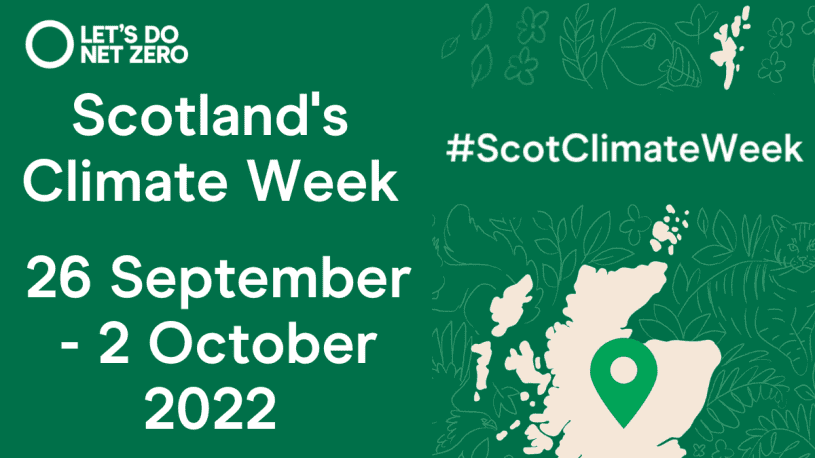Scotland’s Climate Week (26th September – 2nd October) is an annual event championed by Net Zero Nation Scotland, to raise awareness of the climate emergency to encourage action in tackling climate change and reducing our global carbon emissions.

Climate Change & Net Zero
Climate change is being caused by greenhouse gas emission from human activities, such as burning fossil fuels including coal, oil and gas, which are harmful to the environment. The resulting emissions are often referred to as greenhouse gases (GHG) which significantly increasing global temperatures, causing global warming.
Over the past 150 years, average global temperatures have risen by 1.2°C. This rise in global temperature has triggered the global climate emergency, whereby urgent action is required to avoid the potentially irreversible environmental damaged caused.
We are already experiencing more extreme weather events, such as heatwaves, rising sea levels, reduced snow cover and flooding, which are beginning to have an impact in Scotland. Unless we rapidly reduce our carbon emissions, these changes will rapidly accelerate and cause irreversible damage to our economy, environment, and society.
Net zero emissions mean that the amount of greenhouse gases emitted into the atmosphere are balanced by their removal out of the atmosphere, reducing the impact of global warming. We can achieve net zero by cutting our emissions to a minimum and capturing the emissions we cannot prevent.
The term ‘Net Zero’ is also often referred to by businesses and governments to describe their climate targets. The UK government has set net zero targets for 2050, with the Scottish government setting their net zero targets for 2045. At RSE, we recognise the urgent need to address carbon emissions and set challenging targets to achieve net zero emissions by 2030.
RSE’s Bid to Tackle Climate Change
RSE pledges to reduce the environmental impact of the company’s output in energy, materials, and water by adopting circular economy principles and minimising waste wherever possible. We are actively trying to tackle climate change through innovating and refining our operations and business processes, overall aiming to reduce the output of carbon.
RSE has set a net zero stretch target of 2030, for all the company’s direct emissions, including energy consumption, business travel and waste production. We are committed to operating as an ethical and sustainable business, devoted to using innovative thinking to implement environmentally conscious processes and products, allowing us to follow best practice in reducing carbon emissions.
The natural environment is integral to all RSE’s operations, so being at the leading edge of carbon reduction is a key objective within our business strategy and is fully supported from the top to the bottom of our organisation.
The RSE Innovations team are dedicated to researching, testing, and implementing innovative solutions within the water treatment sector, alongside our engineers, who are encouraged to explore low carbon alternatives within their projects. Championed by the work of the RSE Sustainability team, teams from across our business actively work towards and are committed to a low carbon future.
Case Study: Dalwhinnie WTW Recycled TTU
RSE aims to adopt circular economy principles where possible, so our engineers opted to repurpose one of our previous Transportable Treatment Units (TTUs) from Craignure WTW, for use in Dalwhinnie WTW. The TTU was removed from Craignure and transported to our state-of-the-art workshop facility in Muir of Ord for refurbishment and modification, before being delivered on site to Dalwhinnie WTW for installation by our teams.
This project began in 2019 which was prior to Climate Change Assessment Tool (CCAT) requirements, therefore a complete carbon account hadn’t been recorded for the TTU. However to assess the carbon savings of repurposing the unit, our teams compared figures from a brand new TTU for an Islay-based project which was similar in design. The steel for the Islay TTU contained 16,660kg CO2e, with the cladding containing a further 2800kg CO2e – totalling 19,460kg of CO2e for the complete TTU.
From these figures, it was calculated that approximately 19 tonnes of CO2e could be saved from repurposing and reusing the Craignure TTU, rather than our teams fabricating a new unit from scratch. Additional carbon savings were captured from reusing internal equipment and the modular offsite construction approach, which ensured programme efficiencies were gained and the minimisation of carbon emissions associated with the project.
The Dalwhinnie WTW is a great example of implementing the recycling principle of the circular economy, from design through to installation. All RSE projects similarly consider methods of carbon reduction from the outset of the project. The earlier carbon reduction is incorporated into the design phase of a project, for example alternative design and process or low carbon materials, the greater the overall impact will be on carbon reduction.
For more information regarding Scotland’s Climate Week and to learn about the part we must all play in tackling climate change, please visit: https://www.netzeronation.scot
More Info on Scotland's Climate Week
For more information regarding Scotland’s Climate Week and to learn about the part we must all play in tackling climate change, please click on the button below.




